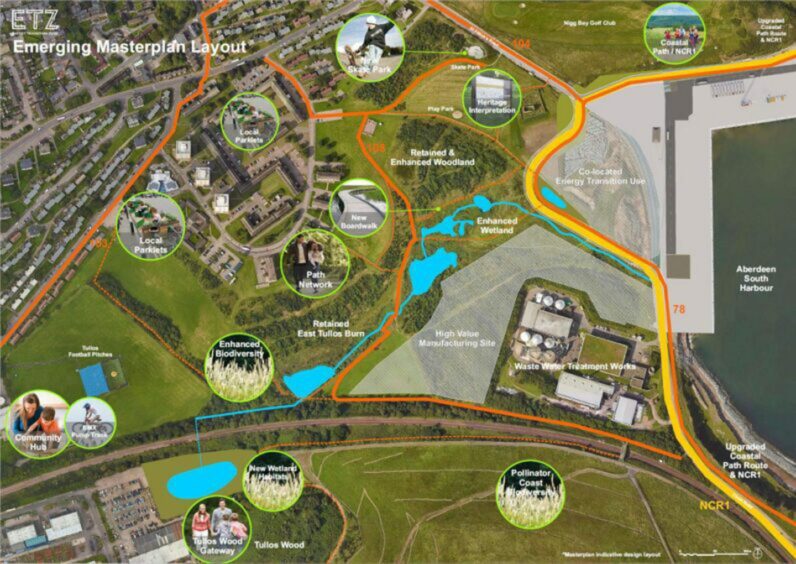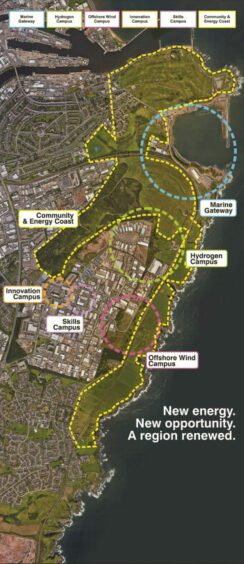 © Supplied by ETZ
© Supplied by ETZ Sir Ian Wood’s Energy Transition Zone is offering £2 million for north-east energy supply chain companies to take advantage of low carbon technologies.
With a maximum of £250,000 per company up for grabs, the ‘challenge fund programme’ aims to support companies working in the oil and gas sector to take advantage of new or existing opportunities in green energy.
Energy Transition Zone (ETZ) is a not-for-profit organisation, chaired by Aberdeen’s Sir Ian Wood, that aims to support the energy transition in the north-east and achieve a just transition for the people in the region.
Freda Miller, energy supply chain programme manager at ETZ, said: “Following on from the success of our pilot fund, which awarded just under £1million to 11 companies across the north-east, ETZ is delighted to launch this first round of the programme which will deliver capital investment grants to help the energy supply chain realise new low-carbon sector opportunities.”
‘Net zero capital of the world’
Targeting firms based in Aberdeen City, Aberdeenshire and Moray, the challenge fund programme and supply chain pathway is backed by the Scottish Government’s Just Transition Fund.
Mairi McAllan, cabinet secretary for net zero and just transition said that the Scottish government is committed to making the region “the net zero capital of the world”.
Ms McAllen said: “We have already committed £75 million to a programme of transformative projects, including almost £10m for the ETZ’s Supply Chain Pathway and Energy Transition Challenge Fund for indigenous supply chain companies.
“I look forward to seeing how these innovative and ambitious projects develop to create and sustain cleaner energy production and jobs, supporting a fair and just transition for the region and for the people of Scotland.”
What’s up for grabs?
ETZ says the cash will help companies in the region break into new areas of the energy sector and “assist the energy supply chain in realising low carbon sector opportunities.”
Ms Miller continued: “This fund will ultimately accelerate the development of new industry-related facilities, new equipment and existing infrastructure upgrades, including digital infrastructure, to drive innovation and market entry and therefore support company growth and creates sustainable jobs.”
Each grant offers between £50,000 and a quarter of a million if a firm’s application is successful.
Previous winners
Winners of the last round are keen to throw their hats in the ring once more to get their hands on some more funds to help their transition to renewables.
Gareth McIntyre director of engineering services provider Global Development Innovation says that the cash “enabled us to transform our business.”
Richard McGowan, managing director of Aberdeen-based engineering company, Fathom Group, said: “The ETZ Challenge Fund has been a game-changer for Fathom, allowing us the opportunity to accelerate completion of new web-based software, in readiness to support our clients in the offshore industries.”
Sealand Projects has used the money to develop ‘SEASITE’, a system that offers condition monitoring and fatigue assessment of Floating Wind Mooring systems.
Managing director of the firm, Graeme MacDougall, added: “Securing grant funding from ETZ has allowed Sealand to accelerate the development of our software, allowing us to realise an opportunity to move to an offshore field simulation trial in Q3 2023, which will support our route to commercialisation in 2024.”
The ETZ campus
Late last year Aberdeen’s Energy Transition Zone showed off blueprints outlining plans on how it will the south of the city will be broken down into five distinct patches as part of its ‘campus model’.
The organisation said at the time that this will “revitalise” industrial sites at Altens, providing firms with the “unique opportunity to invest in the largest dedicated energy transition complex in Scotland”.
The plans aim to “accelerate” energy transition and secure jobs as the UK moves away from fossil fuels and into green energy.
The project sets out to divide the south of the Granite City into a marine gateway, innovation campus, offshore wind campus, hydrogen campus and skills campus.




